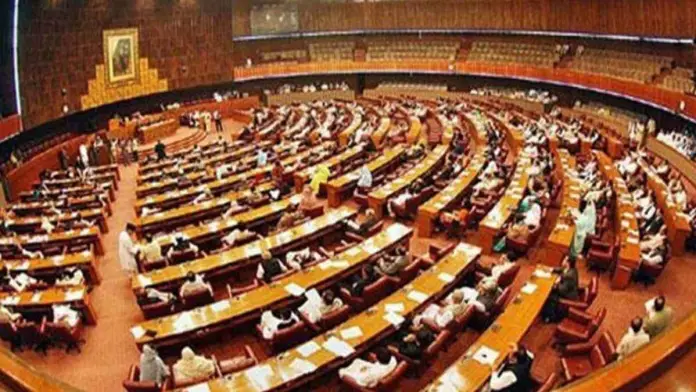Through the 18th Amendment, the political and economic powers of the federal government distributed among the provinces and further into the local bodies. The historic amendment was an outcome of the vision of 14 main political parties, especially the Pakistan People’s Party. Then prime minister Yusaf Raza Gilani declared the passing of the extraordinary document as victory of democracy. But some critics always raise their concern about the amendments that it has ‘weakened’ the federation by dividing a greater chunk of power into the hands of provinces. They argue that the federal government is already struggling to bear its expenditure, and after the 18th Amendment, it is bound to distribute greater financial share to the provinces, and from the remaining amount, it has to allocate huge funds for defence and debts but it does not have enough amount to fund them.
In pre-Covid time, during the fiscal year of 2018-19, FBR collected 4.150 trillion rupees but the federal’s share comprised of just 1.780 trillion rupees. With this amount, how can the federal government defray the defence expenditure of 1.13 trillion rupees and debt servicing of 1.98 trillion rupees which are combined worth of 3.28 trillion rupees? The issue is not restricted to economic means but it has political roots as well. Some argue that Pakistan as a federation has challenges of some ‘separatist movements’ in some areas like in Balochistan, and Sindh; Pakistan has ‘border disputes’ with two neighbouring countries such as India and Afghanistan. These serious problems require a strong central government with enough finances and power to encounter these issues, but after the 18th Amendment the centre has become politically and economically more vulnerable than before. Another major issue is the duplication of the resources; the 18th Amendment opens up new ministries and departments for a provincial government which demands huge number of government employees to run them and they would work parallel to the federal government employees. i.e. Provincial Disaster Management Authority (PDMA) exists parallel to the National Disaster Management Authority (NDMA), information ministry, law ministry, education ministry, religious affairs ministry, revenue authorities exists parallel to their federal counterparts.
The additional departments and ministries put the financial burden on limited government expenditure. Last but not least issue, antagonists of the amendment pointed out excessive power of the provinces against the centre, which means the central government can neither hold accountable nor intervene in the work of the provincial governments. Granting these powers to the provincial governments would welcome the flood of corruption in the provincial sets up. This can be the main issue that’s why the federal government is interested to revisit the 18th Amendment to do some ‘favourable’ adjustments. However, supporters of the amendment put a very compelling argument that it has weakened the agenda of ‘separatist movements,’ if exist in any part. According to a Gallup survey which was conducted in 2012 for the Department for International Development, 67% of the population in Balochistan province favoured greater provincial autonomy, and 37% of people in some districts demand ‘separation.’
This survey shows that the 18th Amendment can be a tool to resolve insurgency. When the amendment was passed, the nationalists had welcomed it and considered it as the fulfillment of long-awaited demand. This shows that the 18th Amendment can effectively counter anti-state elements; therefore, it wouldn’t be an exaggeration to say that the 18th Amendment has saved potential ‘fall of Dhaka’-like situation. Moving to a parliamentary form of the government from a presidential system helps to restore parliamentary sovereignty and democracy in the country. In this system, the prime minister is the most powerful person in the state who and the federal cabinet is accountable to the parliament which is made up of elected representatives of the general people. Thus 18th Amendment implicitly has transferred the power to the people. In 2017, the World Governance Index data shows that Pakistan has improved in governance as compared with the governance system of 2008 and 2012. This report indicates the success of the 18th Amendment through one aspect.
Moreover, democratic forces of the state have successfully transferred the power to the local government authorities who would further lower governance issues and would satisfy the power-hunger elements who demand ‘separate’ provinces on the basis of their ethnicities. If somehow the current government successfully manages to roll back the 18th Amendment then ‘separatist movements’ can convince the local population to demand ‘separation’ like 1971. In addition, a rift can be witnessed since the past few years between officers of the Provincial Management Services and the Pakistan Administrative Services (PAS) over the power-sharing formula. The federal officers get many postings of the provincial governments while the provincial officers believe that the postings of chief secretary, deputy commissioners, and many others are lawful rights of the PMS officers. Hence, it would be wise to say that the 18th Amendment is a blessing through its power-sharing formula as it can bring long-term political stability, which is the basic element to achieve economic and geo-strategic prosperity.
Zunair Nasr is a student of Political Science at the Mushtaq Ahmad Gurmani School of Humanities and Social Sciences of the Lahore University of Management Sciences in Lahore







